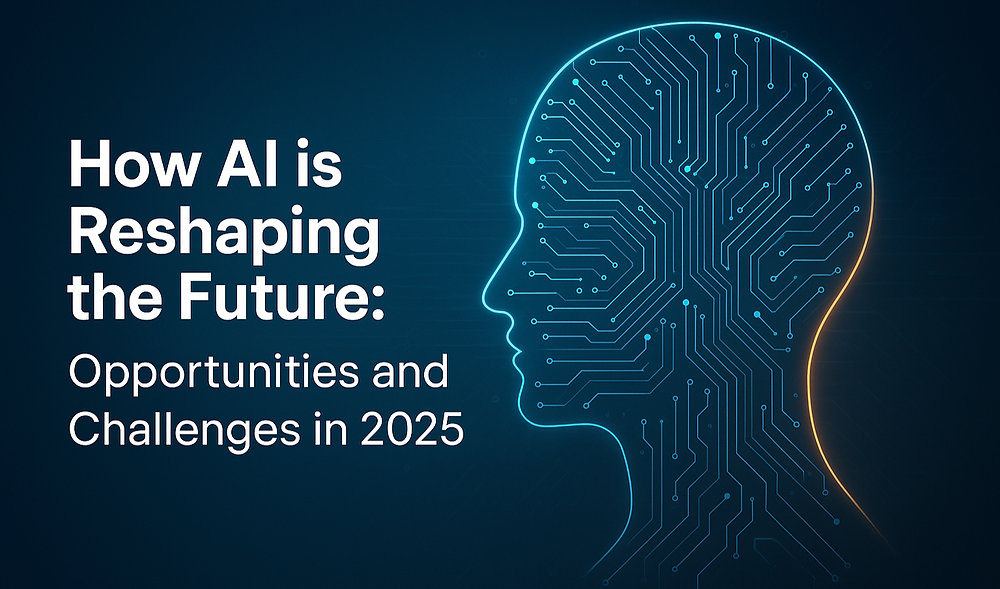
mcaperion.com

How AI is Reshaping the Future: AI Future Trends 2025
3
1
Opportunities and Challenges in 2025 - AI Future Trends

Introduction: AI Future Trends 2025
Artificial Intelligence (AI) has transitioned from a theoretical concept to a core driver of technological advancement across industries. As we progress through 2025, AI’s influence is omnipresent, revolutionizing sectors ranging from healthcare and finance to logistics and entertainment. With innovations in machine learning, natural language processing, and robotics, AI continues to expand its capabilities, reshaping the global economy and society at large.
While AI presents immense opportunities for innovation, efficiency, and productivity, it also introduces significant ethical and operational challenges. The ongoing debate surrounding AI governance, data privacy, and job displacement requires careful attention from policymakers, businesses, and researchers.
This article explores the current landscape of AI, its transformative potential, and the challenges that come with its widespread adoption.
AI’s Presence Across Industries
AI is now integrated into virtually every industry, driving automation, enhancing decision-making, and improving customer experiences. Below are key sectors experiencing AI-driven transformation:
1. Healthcare and Medical Science
AI-powered diagnostics, robotic-assisted surgeries, and predictive analytics are revolutionizing healthcare. Machine learning models enhance early disease detection and personalize treatment recommendations. AI-driven drug discovery is accelerating the development of new pharmaceuticals, reducing research timelines and costs.
2. Finance and Banking
AI algorithms enhance fraud detection, automate financial analysis, and streamline customer service through chatbots and virtual assistants. Predictive analytics empower financial institutions to make data-driven investment decisions and optimize risk management strategies.
3. Manufacturing and Supply Chain Management
AI-powered automation and predictive maintenance are increasing efficiency in manufacturing. Smart robotics and IoT-enabled systems optimize production lines and supply chains, reducing operational costs and minimizing delays.
4. Retail and E-Commerce
Personalized recommendations, AI-driven chatbots, and automated inventory management improve customer experiences and operational efficiency in retail. AI enables businesses to predict consumer behavior, enhancing marketing strategies and product offerings.
5. Cybersecurity and Risk Management
AI-driven security solutions analyze large datasets to detect threats, prevent cyberattacks, and ensure data protection. AI continuously adapts to emerging security challenges, strengthening global cybersecurity frameworks.
Opportunities Presented by AI
AI provides unparalleled opportunities for innovation and economic growth. Some of the most promising advancements include:
1. Increased Efficiency and Automation
AI automates repetitive and labor-intensive tasks, enhancing productivity and reducing human error. This increases operational efficiency across industries, allowing businesses to allocate resources more effectively.
2. Enhanced Decision-Making
AI-driven analytics enable organizations to make data-driven decisions with greater accuracy. AI models analyze vast amounts of data, identifying patterns and trends that human analysts may overlook.
3. Medical Advancements
AI is crucial in medical research, assisting in disease diagnosis, drug development, and personalized treatment planning. AI-powered medical imaging enhances diagnostic precision, improving patient outcomes.
4. Expansion of AI-Driven Creativity
Generative AI models enhance creativity in art, music, and design. AI collaborates with human creators to develop innovative solutions, enriching artistic and commercial endeavors.
Challenges and Ethical Considerations
Despite its advantages, AI presents complex challenges that must be addressed to ensure responsible and ethical use.
1. Ethical Concerns and Bias
AI models are susceptible to biases based on the data used for training. Inaccurate or biased datasets may lead to discriminatory outcomes, necessitating ethical AI governance.
2. Job Displacement and Workforce Adaptation
Automation threatens job displacement in various industries, prompting concerns about workforce reskilling. It is crucial to develop educational programs that prepare individuals for AI-driven roles.
3. Data Privacy and Security Risks
AI’s reliance on large datasets raises concerns regarding data privacy and cybersecurity. Regulations and policies must be established to protect sensitive information and prevent misuse.
4. AI Regulation and Governance
Governments and organizations must implement regulatory frameworks to ensure AI deployment meets ethical guidelines. Transparent AI governance is essential for responsible innovation.
The Future of AI: What Lies Ahead?
AI will continue evolving, shaping the next generation of technology-driven solutions. Predictive trends indicate:
- Greater collaboration between AI and human intelligence
- Expansion of AI ethics and regulatory frameworks
- Innovations in explainable AI, reducing algorithmic opacity
- Integration of AI into quantum computing, enhancing computational power
Conclusion:
Balancing Innovation and Responsibility
As AI reshapes industries and economies, embracing its potential requires a balanced approach. Businesses, governments, and researchers must prioritize ethical development, ensuring AI advancements positively affect society. By addressing the challenges and leveraging opportunities responsibly, AI can pave the way for a future defined by innovation, efficiency, and inclusivity.